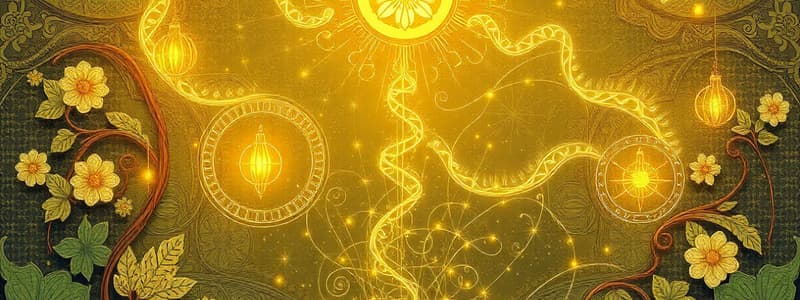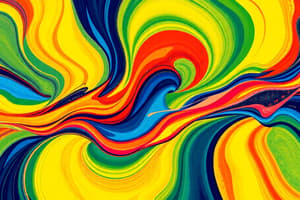Podcast
Questions and Answers
What is the total useful energy output of the lawnmower engine?
What is the total useful energy output of the lawnmower engine?
- 280 kJ
- 700 kJ
- 420 kJ (correct)
- 560 kJ
The energy efficiency of the lawnmower engine is 70%.
The energy efficiency of the lawnmower engine is 70%.
False (B)
What percentage of energy efficiency was calculated for the lawnmower engine?
What percentage of energy efficiency was calculated for the lawnmower engine?
60%
Energy-efficient appliances often carry an _____ rating to denote their efficiency.
Energy-efficient appliances often carry an _____ rating to denote their efficiency.
Match the following energy conservation strategies to their descriptions:
Match the following energy conservation strategies to their descriptions:
Which of the following is NOT listed as an energy conservation strategy?
Which of the following is NOT listed as an energy conservation strategy?
Using lower heat settings on appliances can reduce energy consumption.
Using lower heat settings on appliances can reduce energy consumption.
Name one type of technology mentioned that improves energy efficiency in appliances.
Name one type of technology mentioned that improves energy efficiency in appliances.
The energy efficiency equation is calculated as Useful Energy divided by _____:
The energy efficiency equation is calculated as Useful Energy divided by _____:
What can lead to increased energy efficiency in electrical appliances?
What can lead to increased energy efficiency in electrical appliances?
What is 'phantom load'?
What is 'phantom load'?
Using renewable energy sources can reduce dependence on grid electricity.
Using renewable energy sources can reduce dependence on grid electricity.
How can using a power strip with an on/off switch help in energy conservation?
How can using a power strip with an on/off switch help in energy conservation?
The transfer of thermal energy from an area of high energy to low energy is known as ____.
The transfer of thermal energy from an area of high energy to low energy is known as ____.
Match each term related to thermal energy with its definition:
Match each term related to thermal energy with its definition:
What will most likely happen to the thermal energy of an object as it heats up?
What will most likely happen to the thermal energy of an object as it heats up?
Ice feels cold because it has a higher temperature than a human hand.
Ice feels cold because it has a higher temperature than a human hand.
What would be the prediction regarding the temperatures of two cubes made of different materials after sitting next to each other?
What would be the prediction regarding the temperatures of two cubes made of different materials after sitting next to each other?
To improve household energy efficiency, one can consider using _____ energy sources.
To improve household energy efficiency, one can consider using _____ energy sources.
How can running appliances during peak sunlight hours benefit energy consumption?
How can running appliances during peak sunlight hours benefit energy consumption?
What type of energy is stored in an object at rest?
What type of energy is stored in an object at rest?
Energy can be created or destroyed according to the law of conservation of energy.
Energy can be created or destroyed according to the law of conservation of energy.
What is the primary unit used to measure energy?
What is the primary unit used to measure energy?
The energy that an object has due to its motion is known as ________.
The energy that an object has due to its motion is known as ________.
Match the types of energy with their definitions:
Match the types of energy with their definitions:
Which of the following best describes energy efficiency?
Which of the following best describes energy efficiency?
Improving household energy efficiency can lead to a decrease in environmental impact.
Improving household energy efficiency can lead to a decrease in environmental impact.
What is an example of energy transformation when using a light bulb?
What is an example of energy transformation when using a light bulb?
The energy that is not useful after a process is known as ________.
The energy that is not useful after a process is known as ________.
What happens to potential energy when an object is released?
What happens to potential energy when an object is released?
What happens to kinetic energy when the last ball swings up?
What happens to kinetic energy when the last ball swings up?
Energy can be created or lost in a perfect system.
Energy can be created or lost in a perfect system.
What is the formula for energy efficiency?
What is the formula for energy efficiency?
When a light bulb consumes 1500 J of electrical energy, it produces 1000 J of useful radiant energy and ________ J of thermal energy.
When a light bulb consumes 1500 J of electrical energy, it produces 1000 J of useful radiant energy and ________ J of thermal energy.
Which of the following is an example of energy efficiency?
Which of the following is an example of energy efficiency?
Maximizing energy efficiency can help reduce environmental impact.
Maximizing energy efficiency can help reduce environmental impact.
What is energy dissipation in the context of energy efficiency?
What is energy dissipation in the context of energy efficiency?
A lawnmower engine consumes 700 kJ of chemical energy but loses ________ J as heat and sound.
A lawnmower engine consumes 700 kJ of chemical energy but loses ________ J as heat and sound.
What is the primary goal of improving household energy efficiency?
What is the primary goal of improving household energy efficiency?
Flashcards
Energy Efficiency of a Lawnmower Engine
Energy Efficiency of a Lawnmower Engine
The percentage of input energy converted into useful work (e.g., cutting grass) by a lawnmower engine.
Energy Efficiency Calculation
Energy Efficiency Calculation
Calculating energy efficiency involves dividing the useful energy output by the total energy consumed and multiplying by 100 to get a percentage.
Energy-Efficient Technology
Energy-Efficient Technology
Technologies designed to reduce energy consumption in appliances, like LED lights, inverter motors.
Smart Control Systems in Appliances
Smart Control Systems in Appliances
Signup and view all the flashcards
Appliance Insulation
Appliance Insulation
Signup and view all the flashcards
Regular Appliance Maintenance
Regular Appliance Maintenance
Signup and view all the flashcards
Energy Saving Modes
Energy Saving Modes
Signup and view all the flashcards
Energy Star Rating
Energy Star Rating
Signup and view all the flashcards
Optimal Temp. settings for appliances
Optimal Temp. settings for appliances
Signup and view all the flashcards
Standby energy consumption
Standby energy consumption
Signup and view all the flashcards
Law of Conservation of Energy
Law of Conservation of Energy
Signup and view all the flashcards
Energy Efficiency
Energy Efficiency
Signup and view all the flashcards
Useful Energy
Useful Energy
Signup and view all the flashcards
Consumed Energy
Consumed Energy
Signup and view all the flashcards
Dissipated Energy
Dissipated Energy
Signup and view all the flashcards
Energy Transformation
Energy Transformation
Signup and view all the flashcards
Kinetic Energy
Kinetic Energy
Signup and view all the flashcards
Potential Energy
Potential Energy
Signup and view all the flashcards
Perfect System
Perfect System
Signup and view all the flashcards
Real-World System
Real-World System
Signup and view all the flashcards
What is energy?
What is energy?
Signup and view all the flashcards
What is work?
What is work?
Signup and view all the flashcards
What are the units for energy?
What are the units for energy?
Signup and view all the flashcards
Energy Transfer
Energy Transfer
Signup and view all the flashcards
Difference between Heat and Temperature
Difference between Heat and Temperature
Signup and view all the flashcards
Thermal Energy
Thermal Energy
Signup and view all the flashcards
Temperature
Temperature
Signup and view all the flashcards
Heat
Heat
Signup and view all the flashcards
Why does ice feel cold?
Why does ice feel cold?
Signup and view all the flashcards
Why do different materials feel differently at the same temperature?
Why do different materials feel differently at the same temperature?
Signup and view all the flashcards
What happens as a substance is heated?
What happens as a substance is heated?
Signup and view all the flashcards
What is the relationship between thermal energy and temperature?
What is the relationship between thermal energy and temperature?
Signup and view all the flashcards
Why is heat transfer important?
Why is heat transfer important?
Signup and view all the flashcards
Can two objects at the same temperature have different thermal energies?
Can two objects at the same temperature have different thermal energies?
Signup and view all the flashcards
How is thermal energy related to particle motion?
How is thermal energy related to particle motion?
Signup and view all the flashcards
Study Notes
Unit 3: Winter Chills
- This unit explores energy and its conservation
- Students will understand and calculate:
- The Law of Conservation of Energy in various contexts
- How to calculate energy conservation effectively
- The difference between useful and consumed energy
- Energy efficiency calculations
- The difference between heat and temperature
- Textbook pages 70-74 cover the content
- 3.1 Prior Knowledge:
- Energy is the amount of work an object can do or store
- Work is the amount of force applied over a distance
- The unit for energy is Joules (J)
Energy
- Energy can be potential or kinetic
- Potential energy is the energy an object has at rest
- Kinetic energy is the energy an object has as it moves
- Energy Transformation and Transfer:
- Energy can change from one form to another
- Example: A lightbulb transforms electrical energy into radiant and thermal energy
- Energy can be transferred from one object to another
- Example: Kinetic energy transferred when one player tackles another in a sport
Energy Through a System (Newton's Cradle)
- A system where energy transformations occur
- The red ball's initial potential energy transforms into kinetic energy when released
- Kinetic energy is transferred from ball to ball until the last ball
- The last ball converts kinetic energy back into potential energy
- In a perfect system energy is neither created nor destroyed
- In reality, energy is lost as sound and thermal energy
3.3 Law of Conservation of Energy
- The total energy of a system remains constant throughout
- Start energy = End energy (in an ideal theoretical system)
- Real systems: Energy gets converted into other forms: thermal, sound, mechanical
3.4 Energy Efficiency
- Measures how effectively input energy transforms into useful output
- Usually expressed as a percentage
- Formula: (Useful energy / Consumed energy) x 100
- Higher percentage means more efficient energy use
- Example: A light bulb, 90% of electrical energy transforms into light, 10% lost as heat
Improving Energy Efficiency
- Use Energy-Efficient Technology: Use LED lighting, inverter motors
- Implement Smart Control Systems: Smart thermostats, smart plugs to adjust energy consumption
- Upgrade Insulation and Materials: Reduces heat loss for appliances (refrigerators, ovens)
- Regular Maintenance: Keeps appliances running efficiently (e.g. clean refrigerator coils)
- Optimize Usage Settings: Use suitable settings for appliances
- Reduce Standby Power Consumption: Use power strips, unplug devices not in use
- Consider Renewable Energy Sources: use solar power
3.5 Distinction Between Temperature and Heat
- Thermal Energy: The total energy of moving particles in an object
- Temperature: A measure of the average kinetic energy of particles
- Heat: The transfer of thermal energy from a warmer object to a cooler object
- Example: Ice feels cold because thermal energy is transferred from your hand into the ice (meaning heat flows from your warmer hand to the colder ice)
Examples and Calculations (from provided document)
- Examples show how to calculate energy efficiency of a lawnmower
- Also explores how to determine if cubes made from different materials will have different temperatures after 24 hours
Studying That Suits You
Use AI to generate personalized quizzes and flashcards to suit your learning preferences.




